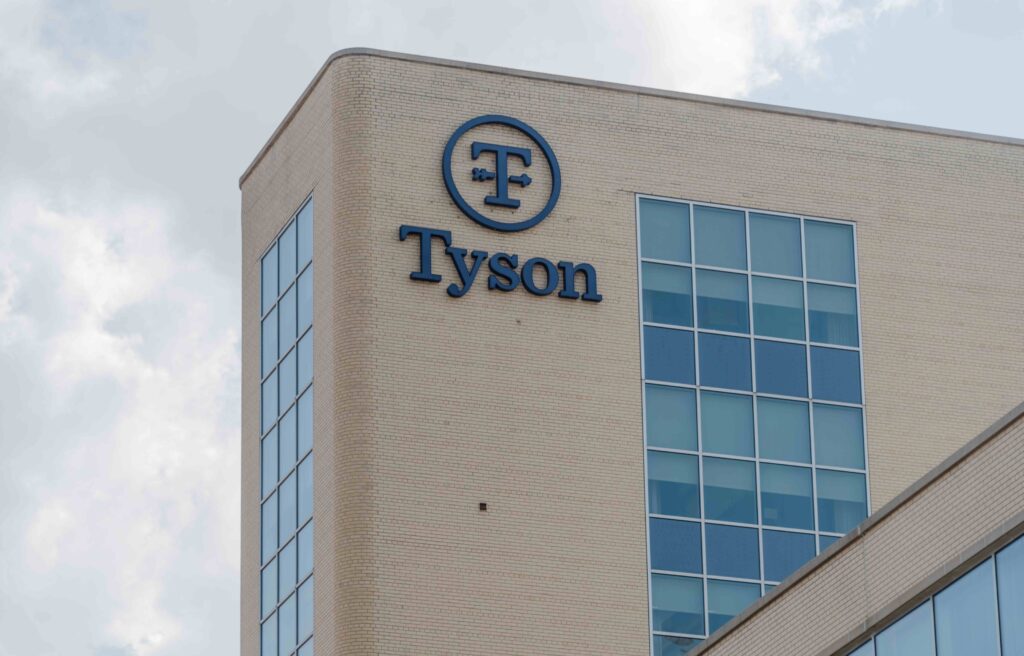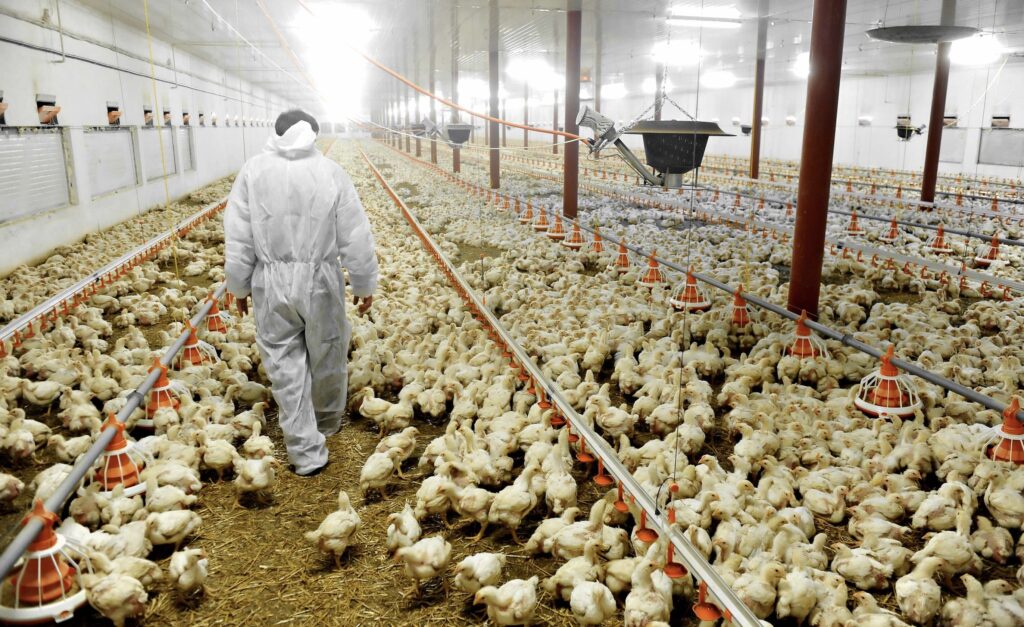Food Price Fixing Is Still Rampant. DOJ’s Agri Stats Lawsuit Could Change That.

Americans continue to suffer from soaring grocery prices while the largest corporations report record profits. It’s easy to point fingers at the dominant players in our food system, like meatpacking giants Tyson Foods and JBS, for raising prices on consumers. In fact, these corporations have been sued countless times for price fixing: competitors coordinating to raise, lower, maintain, or stabilize prices together.
But after 40 years, a behind-the-scenes player is now being called out for orchestrating an industry-wide price-fixing scheme: an agriculture data and analysis company called Agri Stats. Agri Stats provides competitively sensitive information to dominant poultry and meat processors like Tyson Foods, JBS, Cargill, and Smithfield. By providing access to this information, Agri Stats essentially creates a virtual setting where companies can expedite retail price increases, drive down the price paid to producers, and increase their profit margins across the industry.
This act is just as illegal as it sounds, but today’s technology has outpaced the laws of yesterday. Agri Stats’ data-sharing capabilities now enable this form of virtual collusion, where the largest meat processors don’t even have to be in the same room to conspire.
But the tides may be turning on this illegal scheme. Last week, the Department of Justice (DOJ) brought a civil case against Agri Stats for facilitating the exchange of anticompetitive information in violation of the Sherman Antitrust Act.
DOJ’s complaint dropped just as chicken prices hit record highs in the U.S. last week, and we can see Agri Stats’ fingerprints all over these inflated prices. Chicken producer profit margins are at their highest in a year as the top processors like Tyson Foods have decreased chick placements — a move that was likely informed by Agri Stats’ data.
Agri Stats Rigs the Industry for the Largest Corporations
Here’s how the scheme works: The largest chicken, pork, and turkey processors — who should be competitors — have all paid big bucks to Agri Stats and provided the company with detailed data about their costs, output, and prices. This service is widely used across the industry: Agri Stats estimates that its broiler chicken, pork, and turkey subscribers account for more than 90% of each respective market.
In return, Agri Stats takes the processors’ proprietary data, standardizes it, and distributes weekly reports to its subscribers. The reports include so much detail — including how much they’re paying farmers and workers, and retail prices — that everyone in the industry knows exactly what everyone else is doing.

Here’s how the scheme works: The largest chicken, pork, and turkey processors — who should be competitors — have all paid big bucks to Agri Stats and provided the company with detailed data about their costs, output, and prices. This service is widely used across the industry: Agri Stats estimates that its broiler chicken, pork, and turkey subscribers account for more than 90% of each respective market.
In return, Agri Stats takes the processors’ proprietary data, standardizes it, and distributes weekly reports to its subscribers. The reports include so much detail — including how much they’re paying farmers and workers, and retail prices — that everyone in the industry knows exactly what everyone else is doing.
A key part of the equation is that Agri Stats enables processors to coordinate in restricting the supply of meat. By using Agri Stats to monitor each other’s production plans, processors can ensure that no one attempts to increase production and expand market share. Sanderson Farms and Pilgrim’s both explicitly discussed making broiler supply decisions based on Agri Stats data during earnings calls. Food retailers have even sued pork processors alleging they engaged in a coordinated effort to minimize production and boost prices by lowering the number of hog farms in operation by 70%.
While the information shared in Agri Stats’ reports is technically anonymous, it’s easy enough to figure out who’s who — another consequence of having so few players in these highly consolidated sectors. It’s difficult to see how this is any different than if the dominant firms were simply sitting in a room together colluding to set the market for consumers and farmers.
Not only does Agri Stats provide this granular data to its subscribers, but it also helps subscribers learn from it and provide guidance and insights: The company is known to make detailed presentations to its subscribers identifying items and customers to target for price increases so they can increase revenue.
Agri Stats’ intention is to raise industry-wide profitability of the meat sectors it services, harming competition. While processors could factor this data into a decision to increase production when their prices are lower than their competitors’ prices, they might capture a larger share of the market, but this would presumably lower overall industry profits. As DOJ’s complaint asserts, “Agri Stats instead enables and encourages processors to increase prices and restrict output to boost profits industry-wide.”
Agri Stats’ Work is Just as Illegal as it Sounds
While the processors willingly share this information with each other through Agri Stats, the company’s “give-to-get” policy ensures that the processors’ workers, farmers, and customers — like grocery stores and restaurants — don’t have access to this information. This puts them at a competitive disadvantage. Agri Stats’ scheme only serves to drive up corporate profits, crush competition, lower prices paid to producers, and keep prices high for consumers. Behavior like this is why we have the Sherman Act; it just needs to be enforced.
Farmers Lose Money and Bargaining Power
Agri Stats has put farmers and workers at a severe disadvantage in the poultry sector. Agri Stats provides the handful of powerful poultry firms in the consolidated industry with access to detailed information about farmers’ pay, which gives the corporations extraordinary power when negotiating contracts.
For example, Agri Stats’ reports include information on how much producers are being paid per chicken and comparisons of regional pay with the national average. Pilgrim’s Pride even recently agreed to a $29 million settlement in a wage-fixing lawsuit that includes Agri Stats as a defendant.
But none of this information is available to the farmers or workers themselves, putting them at a severe disadvantage when they try to negotiate contracts or ask for pay raises. And it’s not as if farmers can just sign up with another company. Poultry companies have an unspoken agreement not to poach farmers from one another, and there may not even be other options for farmers to turn to in their region. Half of poultry growers only have one or two integrators available to work with because the industry is so consolidated.
Poultry growers are getting paid less as a result: The National Chicken Council found that average farmer pay fell more than 6% between 1988 and 2015 when measured in 2009 dollars.

Consumers Pay More as Processors Reap Record Profits
DOJ’s lawsuit shows that Tyson, Sanderson, Cargill, and JBS have all raised their prices because of Agri Stats. In a recent article, Open Markets Institute highlighted that during the alleged conspiracy, turkey processing margins increased 300% in just three years, Tyson Foods saw its operating margin grow from 1.6% in 2009 to nearly 12% by 2016, and wholesale pork prices rose over 50% in five years after nearly a decade of relative price stability. That money is coming right out of consumers’ pockets.
Agri Stats has been named as a co-conspirator in countless price-fixing lawsuits which have resulted in settlements totaling hundreds of millions of dollars for meatpackers in recent years — though it’s hardly made a dent in their record profits. The laundry list of litigators includes McDonald’s, Buffalo Wild Wings, Chick-fil-A, Hooters, Sonic, Whataburger, Target, and Walmart. In January, the two largest U.S. food distribution companies, US Foods Inc and Sysco Corporation, also sued Tyson Foods and other dominant poultry companies, alleging that they used Agri Stats data as a tool to coordinate their production cuts which led to inflated prices for consumers. Food retailers Walmart, Kroger, Albertsons have brought similar suits.
Remember Those High Egg Prices?
DOJ’s complaint against Agri Stats highlights a concerning parallel with the recent egg price gouging scheme. Last winter, Farm Action called out egg suppliers for price gouging consumers as the dominant egg company increased its gross profit margins five-fold after drastically raising the price of its eggs.
The egg industry uses a company called Urner Barry for referencing egg prices. When egg prices went up and we pointed to the industry’s anticompetitive behavior, industry actors simply said they were tracking with Urner Barry’s pricing information. We can’t be sure whether Urner Barry played a role in driving up egg prices or if companies were just using their information to coordinate the price hikes as processors do with Agri Stats, but it’s a concerning parallel.
While Agri Stats is not alone in providing industry actors with information so they can extract more profits from farmers and customers, they take it a step further by including wage information.
DOJ Takes Another Bold Action Against Corporate Power in Our Food System
DOJ’s action is a bold step to take on the federal courts’ continued rulings favoring monopolists and the practices that keep them in control, like the recent improper ruling from the northern district of Illinois that decided in favor of Agri Stats. The court said the information Agri Stats provides to processors isn’t granular enough to have an impact on pricing and to enable market manipulation, but DOJ’s case lays out evidence showing processors did just that.
We applaud DOJ for working to correct the Illinois ruling and for being aggressive in cracking down on anticompetitive behavior on behalf of America’s farmers and consumers. As we discussed in our recent report card, DOJ has been on a roll since President Biden’s executive order to increase competition across the economy. They banned use of the tournament contract system for poultry growers for 15% of the market last year, released new merger guidelines to put protections in place for a free and fair economy, and have mounted efforts to block further consolidation. We’re encouraged by their commitment to addressing competition in agriculture markets.
Our Food System Should Work for Everyone, Not Just a Handful of Corporations
The services provided by Agri Stats make it easier for the dominant processors to coordinate to boost profit margins off the backs of farmers and consumers and to further secure their grip over the market. This case highlights why it’s so harmful to have only a handful of corporations controlling the market: It makes it far easier for the few companies to collude and harm everyone other than themselves. Companies like Agri Stats should not have the power to rig our food system. DOJ is taking a critical step in protecting farmers, workers, and consumers with its lawsuit.
Written and edited by: Jessica Cusworth, Angela Huffman, Dee Laninga, Christian Lovell, and Joe Maxwell.